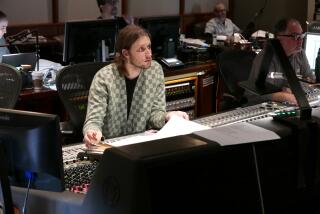George Duning; Prolific Film Composer
- Share via
George Duning, a prolific composer of music for television and motion pictures who was nominated for Academy Awards five times, has died at the age of 92.
Duning, who scored such classic films as “From Here to Eternity” and “Picnic,” died Sunday at Alvarado Hospital in San Diego of cardiovascular disease.
The former jazz trumpeter was nominated for Oscars for those two films in 1953 and 1955, respectively. He also was nominated for “Jolson Sings Again” in 1949, two years after he began his contract with Columbia Pictures; for “No Sad Songs for Me” in 1950; and for “The Eddy Duchin Story” in 1956.
During his 15 years with Columbia, Duning composed music for about half a dozen motion pictures a year. Among them were “Let No Man Write My Epitaph,” “My Sister Eileen,” “3:10 to Yuma,” “Houseboat,” “That Touch of Mink” and “Bell, Book and Candle.”
Duning also composed extensively for television series, including “The Big Valley,” “Alcoa-Goodyear City Theatre,” “Naked City” and “Star Trek.” He wound up his long career as musical director of Aaron Spelling Productions.
Top-quality music in movies and television shows, he often said, helped upgrade the public’s taste in music. And he made no secret of his disdain for the rock ‘n’ roll that emerged during his most productive years.
“Rock ‘n’ roll is a phonied-up, made-to-order fad,” Duning told The Times in a 1960 interview. “And disc jockeys do a disservice to the kids by playing it.”
He admitted at the time that his own teenage daughters played rock ‘n’ roll records in his home. But he said his hopes that their tastes would change were raised when one daughter heard Duke Ellington on the radio, thought he was a new musician and rated him “great.”
If Elvis Presley had never earned Duning’s musical appreciation, Ellington always did. Duning’s own career began with jazz.
Born in Richmond, Ind., a center for early jazz recording, Duning grew up hearing music. His father was a conductor and sang in oratorios, and his mother gave organ and piano lessons. He studied music theory at the Cincinnati Conservatory of Music and studied composition with Mario Castelnuovo-Tedesco.
Duning started his own band at age 15, and after college joined various jazz bands as a trumpeter. He also played with marching bands and concert bands.
In the 1930s, Duning got his initial career boost when he was hired as musical director of the radio game show “Kay Kyser’s Kollege of Musical Knowledge.” In 1939, when Kyser signed with RKO to do a series of films, Duning went along as musical arranger.
The work was interrupted by World War II, which put Duning in the Navy as conductor and arranger for the Armed Forces Radio Service.
Throughout his Hollywood career, Duning worked in musicians’ organizations. He served on the Board of Directors of the American Society of Composers, Authors and Publishers from 1972 to 1985 and as the organization’s vice president from 1978 to 1979. He also served on the board of the Academy of Motion Picture Arts and Sciences.
Duning earned a career achievement award from the Society for Preservation of Film Music in 1987, and was named Indiana Composer of the Year in 1993. He also won awards from the Hollywood Foreign Press Assn. and Downbeat magazine.
He is survived by his wife, Lois, of Borrego Springs, Calif., and La Jolla; two daughters, Kathleen Frankeberger and Patricia Brayton of Port Townsend, Wash.; a brother, LeRoy Duning of Lebanon, Ohio; five grandchildren; and two stepchildren.
More to Read
The biggest entertainment stories
Get our big stories about Hollywood, film, television, music, arts, culture and more right in your inbox as soon as they publish.
You may occasionally receive promotional content from the Los Angeles Times.










